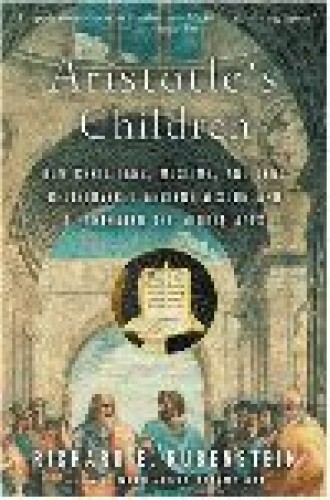Aristotle's Children: How Christians, Muslims, and Jews Rediscovered Ancient Wisdom and Illuminated the Dark Ages
About 15 years ago a proposal to eliminate the Th.D. degree was brought before a Harvard Divinity School faculty meeting. Those favoring the proposal argued that the degree is anachronistic and offered by few graduate schools. But the late George Hunston Williams eloquently opposed eliminating the degree, recalling the historic moment in 1215 when the University of Paris faculty of theology successfully asserted its hegemony over the faculty of philosophy by denying it the privilege of “reading” (lecturing on or discussing) Aristotle. A degree with such an illustrious precedent, Williams said, must be maintained. And it was.
Richard Rubenstein’s Aristotle’s Children provides the context for Williams’s assertion. Rubenstein, professor of conflict resolution and public affairs at George Mason University, is an expert on religious conflict in both its historical and modern manifestations. Although historical theologians have discussed his cast of medieval characters many times, Rubenstein’s perspective is new. He narrates the saga of the battle over Aristotle’s teachings with a conflict-resolver’s eye to common ground and to the good intentions of the disputants, as well as to the differences. The result is an accessible and persuasive book.
Rubenstein argues that the rediscovery of Aristotle’s works marked “a turning point—perhaps the turning point—in Western intellectual history,” creating a conflict between traditionalists and rationalists as Latin translations came to Western libraries in the 1150s from the more advanced Islamic civilization. Aristotle, called “the Philosopher” by some thinkers and “the godless philosopher” by others, provided the principles underlying the scientific method. Rubenstein summarizes Aristotle’s contributions to scientific method: “the idea that the world our senses show us is real, not just a shadow of reality; that humans using their reason are capable of discovering general truths about this world; that understanding phenomena means comprehending relationships of cause and effect; and that natural processes are developmental, revealing to skillful inquirers orderly patterns of growth and change.”
Science’s “myth of origin” claims that modern science originated from a struggle against “dogmatic, obscurantist religion,” replacing medieval Catholicism’s worldview with a method based on observation and experimentation. Refreshingly, the church is not the villain of Rubenstein’s account; both traditionalists and rationalists were churchmen, and “the leading force for transformative change in Western thinking [was] the leadership of the Catholic Church,” he states. The marriage of faith and reason created a medieval renaissance that culminated in the writings of Thomas Aquinas and lasted as long as Aristotle remained in favor. The villains in Rubenstein’s account are Luther, in whose teachings faith defeated reason, and Hobbes, who “fought to free the secular state from Catholic political and moral claims.” Both found “Aristotle’s optimism about human reason a dangerous delusion.”
Rubenstein is not reluctant to draw suggestions for the present from the scholastic philosophers’ eagerness to integrate faith and reason. Aristotle’s “revolutionary new ideas from non-Western sources,” together with mass protest movements, created societies willing to “engage each other in an intense, continuous dialogue productive of new insights for both sides.” In a 21st-century world torn by religious fundamentalisms and power politics, the scholastic philosophers can model dialogue between “rationally influenced faith” and “ethically interested reason,” a dialogue that can produce “norms that are both reasonable and ethical,” Rubenstein states. His book makes for stimulating and thought-provoking reading, effectively overturning caricatures of scholastic philosophy while convincingly suggesting how its insights can be applied to the present.





